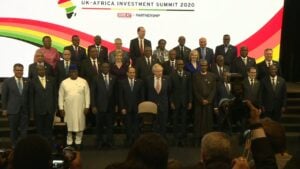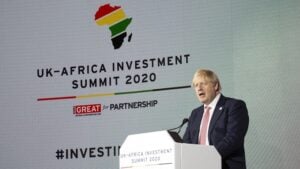
Two important international events for Africa took place over the last 10 days of January 2020: the World Economic Forum in Davos and the UK- Africa Invest Summit.
The first event stuck in memory only by Patrice Motsepe’s ‘Africa loves Trump’ comment. But the London summit gave fruitful results for both parties.
The event took place on January 20, 2020. 15 African heads of state, including the presidents of Egypt, Kenya, Ghana, Nigeria, representatives of business and international organizations participated in it.
The direct results of the summit are state initiatives worth over £1.5 billion and 27 business deals worth over £6.5 billion.
The main commercial agreements of the summit are:
The most important government initiatives are the following:
The Summit is particularly important in the context of Britain’s withdrawal from the European Union. Post-Brexit Britain needs to strengthen its political and economic role in other regions. Particularly in Africa, which has a large potential market and growing political power.
Therefore, this summit is a direct evidence that Britain decides to participate actively in the so-called “struggle for Africa”.
Trade with Africa amounts to 4.2% in 2012 and 2.5% in 2017 of total UK trade. But it’s only 2% as large as Africa’s trade with China, its main partner.
But Britain wants to improve this situation. Representatives of the UK government have informed that by 2022 the UK aims to become the largest investor among the G7 in Africa.
In 2019, the UK trade with Africa increased by 7.5%. The country has 11 agreements with African countries on exports with reduced or zero tariff rates, and 35 countries fall within the trade preferences scheme.

Britain’s interest on Africa is fully justified. For instance, 8 out of the 15 fastest-growing countries are in Africa and by 2050 one in four buyers will hail from Africa. Furthermore, the political role of Africa is becoming more important: 54 countries of Africa represent almost a third of the votes in the UN General Assembly
But Africa is a tasty morsel not only for the UK but for China, India, Russia and the EU either. From 2010 to 2018, Chinese leaders visited Africa 79 times. Emmanuel Macron visited the continent nine times since winning the 2017 elections. Russia expressed interest on the continent through a large-scale forum and debt relief.
In the light of abovementioned, Britain, which has a negative image due to its colonial past and the fears of neo-colonialism trends, needs to offer a qualitatively new type of cooperation.
The UK government will not be able to provide the same level of financial support as China. Therefore, the British strategy should be based on soft power and the conveyance of the British worldview.
In addition, the United States recently declared a 10% reduction in military presence in Africa, and this creates a window of opportunities for other countries, including the UK. For example, France has already indicated its intention to increase its military mission in Mali, so Britain can act in the same direction.
Summing up, Africa is a continent of opportunities now. For the UK, as for the former colonial metropolis, it will be important to create a unique approach to Africa. The continent keeps multi-vector foreign policy. However, Africa needs equal cooperation, but in the case of China or Russia, this does not seem possible. And this leaves room for a stronger British role.